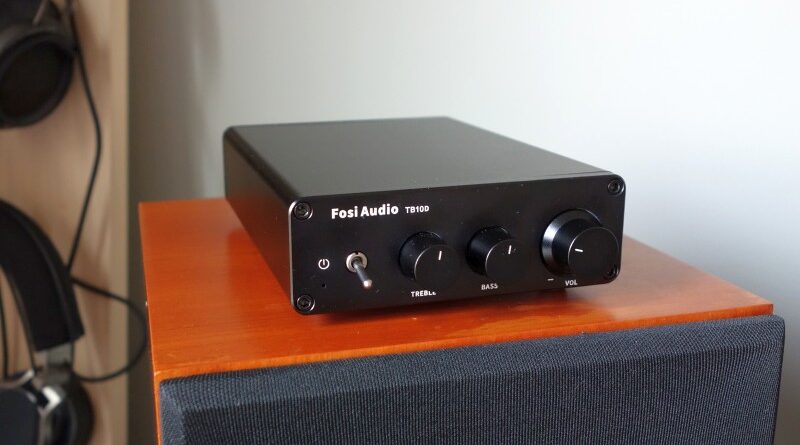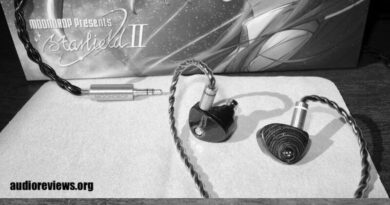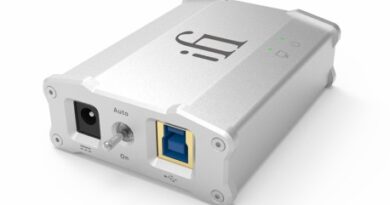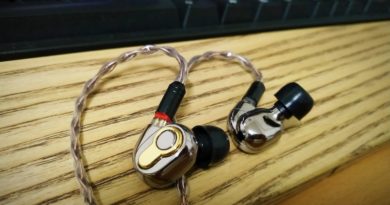Fosi Audio TB10D (Upgraded) Review – Hubris Maximus
In this Article
INTRO
Something of a new category for us at Audioreviews has graced my desk, the Fosi Audio TB10D priced at $80 and occasionally found on sale. Apparently this is the “upgraded” version. There was an older version that was removed from the market most likely due to the hiss, noise and crudeness of the sound.
Safe to say this upgraded version seems to have fixed these complaints. Bad news, there is no indication on the product itself to know what version you have other than the box that everyone throws away.
It’s hard to miss Fosi Audio products if you are a regular Amazon customer that browses audio related products. The algorithm wags them in front of me quite often. There is quite the plethora of mini desktop efficient class D amps on the market.
I even have several from back in the day like the Dayton Audio DT100A, and the Lepai LP2020A. The Fosi Audio TB10D is a newer generation of higher powered and good sounding compact amplifiers as long as you ignore their overly exaggerated output power claims.
Disclaimer: Fosi Audio provided this free of charge and without any ransom attached. These are my thoughts at least that is what the voices inside my head tell me.
GUTS AND GUSTO
The Fosi Audio TB10D utilizes the Texas Instruments TPA3255 multi-functional chip that can be configured as a 4 channel, 3 channel (2.1) in the form of their BT30D Pro coming up later, 2 channel or Mono amp capable up to a maximum output of 600W dependent on the power supply used.
The configuration is done as part of the final design, it is NOT user select-able. TI specifies a 53.5V power supply to meet the crazy power ratings along with ample amperage, so anything less will reduce output capabilities. The Fosi Audio TB10D will accept 18-48V power and speakers from 2-8 ohms according to the manual.
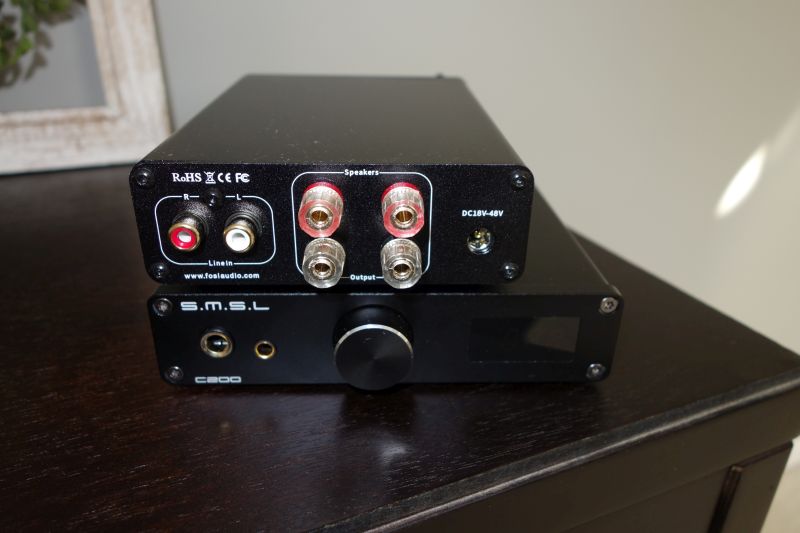
Fosi configured the TB10D as a 2 channel design internally bridging it down to two channels and using an appropriate filter. They included a 32V 5A power supply and given the 90% efficiency rating of the amp we should expect no more than about 80W per channel (32V x 5A * 90%= 160W /2 channels).
I would safely put this somewhere around a 50W-70W x 2 of clean amplifier power. I have seen it tested elsewhere to reach un-distorted power levels of 88W and up to 100W at 1% distortion. This is pushing the limits of the included power supply.
IMPROVEMENTS OPPORTUNITIES
One oddity of the Fosi Audio TB10D involves the weird order of the bass and treble knobs, at least for me. Usually they are laid out Bass and Treble going from Left to Right respectively. The other problem is there are no markings for position, and no middle detent to find the zero point at 12 o’clock. I wonder if users know this or just turn the knobs to zero thinking this defeats the controls. A defeat switch would be nice at bare minimum.
Returning to the topic of power supplies, the power brick has no markings of a Nationally Recognized Test Lab (NRTL) like UL, Intertek of TUV so there is a minor risk associated with not having it certified by a NRTL lab. In fairness, the vast majority of Non-US equipment lacks this certification.
This is the compromise for an astonishingly budget price of $80. Around here you can pick up used older AVR’s from Denon, Yamaha, etc for under this, but they are not anywhere nearly as compact.
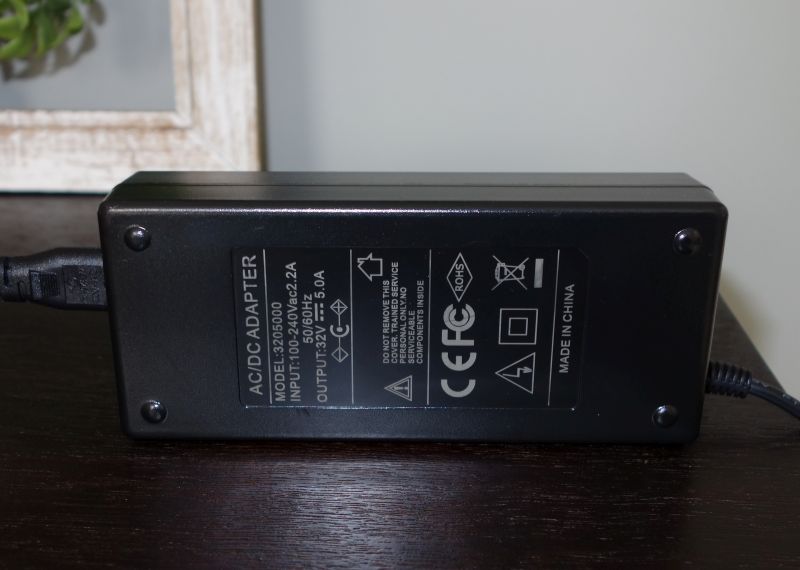
SOUND
A few of my friends and I pooled some gear together to have a late night jam session on the Fosi Audio TB10D. Tested with the Behringer Truth 2030P, Martin Logan Motion 35XTI, Kef Q350 and my own large WEBB VIP12 Frankenstein 3-ways, the Fosi Audio TB10D could hold its own against a classic Nelson Pass designed Adcom GFA-545. Input to the Fosi Aduio TB10D was driven by a Denon HEOS Link and SMSL C200 DAC.
The bass had enough slam with the Behringer delivering quite the impactful hits to my chest. Since these were mostly 4 ohm speakers, the treble sounded quite flat and devoid of any artificial tendencies. I believe with 8 ohm speakers there might be a slight rise (most likely inaudible) at the tippy top, this is typical of many class D amps utilizing an output filter. The Adcom GFA-545 with it’s large power supply capacitor reserve had better bass control, but it was a minuet difference.
Channel separation was plentiful giving the sound stage ample room for width and depth with no noticeable channel bleeding. I recommend keeping the volume knob below about 60-75% max, because to me after this set point distortion levels started to color the sound and make it less pleasant to enjoy.
COMPARISONS
Paired up with the large 12inch 3 ways, this amp sounds bigger than it should. Plenty of power for some spirited music listening, but it’s not on the same level of my larger Denon AVR-3806 (130Wx2), Adcom GFA-545 (100Wx2) or my SAE-205A (200Wx2).
It gets plenty loud filling the room with good control, but it’s not hard to hear when you reach the higher distortion levels. It pairs better with bookshelves on the desk, and more than plenty for this application. It drives the Behringer Truth 2030P to deafening levels at <3m.
The Fosi Audio TB10D has excellent punch and powers them with authority, especially given these are 4 ohm speakers. Fosi Audio claims the TB10D can power speakers ranging from 2-8ohm, so it should handle any 4 ohm loads that dip below this threshold. Given the 90%+ efficiency, the Fosi Audio TB10D barely gets warm.
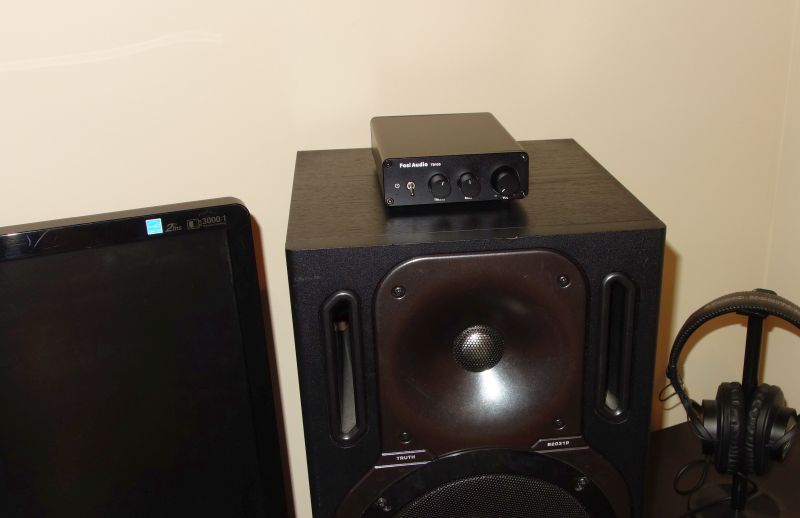
Compared to the JBL 305PMkII with their built in class D amplification, the Fosi Audio TB10D Behringer 2030P combo is a brute. It doesn’t have the boundary options that the JBL has, but it does have a much quieter disposition. The JBL 305P MKII is known for its hissy nature, the Fosi Audio TB10D did not exhibit any unwanted hiss.
While the Lepai LP2020A had its heyday, the output power of 15W and rudimentary 1980’s boombox styling is yesterday’s news. While the Lepai has a tone defeat switch, it suffers from turn on pop (but so does the Adcom GFA). The Fosi Audio TB10D does not have turn on pop.
The Dayton Audio DTA-100A also felt underwhelming in power compared to the Fosi Audio TB10D. I do not know if Dayton has improved build quality of these amps in later iterations, but the internal circuitry looked a bit messy. I have seen internal shots of the Fosi Audio TB10D online, and it looks cleanly designed.
FINAL
Despite the exaggerated power claims, the Fosi Audio TB10D seems overkill for a desktop amp, and just a bit under-powered for a larger room for those that want the required dynamics for realism. The extra power is appreciated although not fully utilized in a desktop scenario unless you have really in-efficient speakers <86db sensitivity.
I know other reviewers had valid issues with the original version of this amp, but Fosi Audio seems to have rectified whatever the problem was on the early generation. While I wish the power supply was certified by a NRTL, at least it can be swapped out for something else in the event it fails.
It’s an $80 realistically outputting closer to 80Wx2 amp. I would recommend whole heartily for a desktop application, a small room/apartment, garage or back yard movie night.
| PROS | CONS |
| Good size, plenty powerful and clean for a desktop amp or a smaller room/apartment. | Power supply not certified by a NRTL |
| Casing is solid and good heft to keep it firmly planted. | Inflated power claims-not a 300W amp with included power supply |
| Tapered volume knob felt solid, as well as the bass and treble | Should have been renamed to differentiate from the early versions. |
| Banana Speaker connections feel a little cheap, but it give you options. | No tone defeat and no zero position markings or detents. |
SPECIFICATIONS FOSI TB10D
- Output Power: 300watts x2@4Ω
- Terminating Impedance: 2Ω – 8Ω
- Input Mode: RCA
- Output Mode: Passive Speakers
- Frequency Range: 20Hz – 40kHz (±1 dB)
- THD: ≤ 0.3%
- SNR: ≥ 90dB
- Chip Set: TPA3255
- DC Input Range: DC 18V -48V
- Device Weight: 1.05kg
- Power supply: 32V 5A
DISCLAIMER
Thank you fore reading my review of the Fosi TB10D amplifier. Get it from FOSI AUDIO Store or at participating retailers.
Our generic standard disclaimer.



